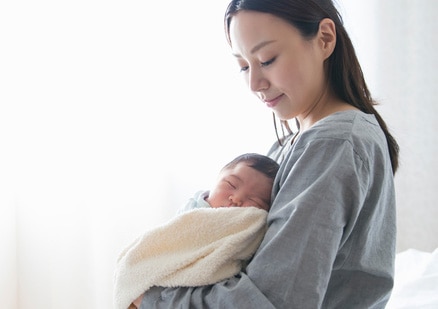During your stay

You’ll recover in a private room with a private bathroom and a number of state-of-the-art amenities.
Your nurse will help you get comfortable caring for your newborn, and support you through umbilical cord care, diapering, bathing, swaddling, and breastfeeding.
Rooming in
Research shows that babies who stay in the same room as their mothers adjust better, and new moms rest and recover better. We keep your baby with you as much as possible throughout your stay, so you can bond and learn to recognize your baby’s needs.
Hand-washing
As your new baby’s immune system develops, hand-washing is an important way to prevent infection. Protect your newborn by asking visitors to wash their hands before touching your baby. If anyone is sick — even mildly — ask them not to visit until they are feeling better.
Newborn security
Your baby’s security is important to us. Never leave your baby unattended. If you need to be away from your baby for any reason, let your nurse know so we can make sure your little one is safely cared for.
Additional security measures are also in place and will be explained during your stay.
Your baby will stay with you in your room unless there is a medical reason for your newborn to be in the NICU.
If you’re ever uncomfortable with the person who is asking to take your baby from you, use your nurse call button to ask for an additional staff member to confirm the request.
Newborn screenings
All newborns undergo painless hearing screening tests. The hearing test is performed by a newborn hearing screening technician and the cardiac test, which looks at your baby’s heart health, will be performed by your nurse. These tests will be done in the postpartum unit before you go home.
Breastfeeding
Breast milk is nature’s perfect first food, and breastfeeding can enhance the bond between you and your baby. The American Academy of Pediatrics recommends exclusive breastfeeding for 6 months and continued breastfeeding through the first year of life.
Learn more about breastfeeding >
Support for successful breastfeeding:
- The “Breastfeeding with Success” class will help you learn about breastfeeding positions, milk supply, preventing and managing pain, pumping, milk storage, and working while breastfeeding.
- We encourage skin-to-skin contact, which triggers healthy baby behaviors. It helps your little one stay warm on their own, breathe on their own, and learn to nurse.
- All of our labor and delivery and postpartum nurses are trained breastfeeding specialists. We also have a team of internationally board-certified lactation consultants at our hospitals and outpatient breastfeeding clinics.
Lactation consultants
If you need additional support, a lactation consultant will come to help you while you’re in the hospital. Lactation consultants are also available after you go home. For additional information or to make an appointment call Member Services at 404-365-0966 or our Maternal Child Health Department at 770-496-3409.
Leaving the hospital
After you have your baby, you’ll be seen daily by a midwife or obstetrician who will care for you during recovery and help determine when you’re ready to go home. The length of your hospital stay will depend on a variety of factors.
If you have a vaginal birth, you may be ready go home when your baby is 1 day old. If you have a cesarean birth, you’ll need to stay a bit longer.
You’ll be provided with a list of all the things that need to happen before you’re discharged. On the day you leave the hospital, we’ll try to complete the discharge process in the morning so you can get home and settled in for that first night on your own with baby.
Secure checkout
When you’re ready to leave, your support person should bring the car up to the front of the hospital where you may have entered in labor. A staff member will wheel you and your baby downstairs after you’ve gone through our secure checkout.
Car seat
Georgia law requires that you take your baby home in a car seat. Our staff is not licensed to assist or direct you with car seat usage or installation, so we encourage you to take our “Infant Safety and CPR” program before your baby is born. It also helps to have your car seat installed a few weeks before your baby is due.
If your baby was born before 37 weeks, we’ll conduct a car seat challenge test. This test is done before you’re discharged and checks your baby’s breathing while in the car seat. It does not check the proper installation of your car seat.
Car seat installation resources
Always read and follow the car seat instructions, as well as your vehicle seat belt instructions. You can find guidelines for safe car seat installation online. You can also call 1-866-SEAT-CHECK (1-866-732-8243), or go to seatcheck.org to find a seat-inspection location certified by the National Transportation Safety Board.